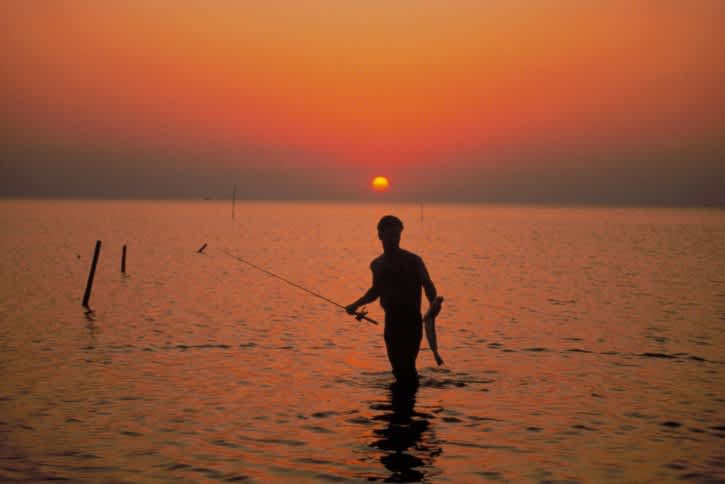Fishing Against the Fringe
Matt Tinning 03.20.12

American comedian Steve Wright once said “there’s a fine line between fishing and just standing on the shore like an idiot.”
The same is true of fisheries policy. When it comes to those seeking to shape the complex task of managing our nation’s fisheries, there are countless fishermen and fishing groups–many with diverse and often opposing perspectives–who participate constructively in the public policy process. And then there’s the Recreational Fishing Alliance.
Let’s get something straight: fishermen are conservationists. They cherish the resource that defines their lifestyle, and they are willing to do the hard work it takes to sustain it. Many of the most significant marine conservation advances are driven by commercial fishermen concerned by what they see on the water, and by recreational anglers whose love of the ocean fuels their sporting passion. Their interest in securing healthy oceans and productive fisheries isn’t abstract or merely intellectual. For fishermen, it’s personal.
All the more surprising, therefore, that some lawmakers take their lead on fisheries issues from a fringe group lacking popular legitimacy–one that specializes in conspiracy theories and truly vile rhetoric. As they stage their ‘Keep Fishermen Fishing’ rally on March 21, it’s timely to ask: who is the RFA and why would anyone listen to them?
RFA was formed in 1996 with a goal of becoming the premier political voice for America’s recreational anglers. To listen to the pronouncements of their leadership you’d think they had come close to succeeding. But the truth is that they’ve never attracted any meaningful base of popular support. In contrast with myriad other recreational fishing groups that have been built from the ground up through the shared commitment of individual anglers and small businesses, RFA was established by a big dollar investment from Viking Yachts. That single donor acknowledges having funneled over $7 million to RFA coffers, allowing the organization to stay afloat and masking their spectacular failure to attract grassroots support.
Let’s take a hard look at the numbers. The United States has over 12 million recreational anglers. RFA was founded with the stated aim of mobilizing 1 million of them as members. They now claim to represent 50,000 anglers. But their latest tax filing exposes even this number as pure fantasy: after 15 long years, the truth is they received a $35 annual membership fee from fewer than 6,500 people nationwide in 2010. That’s dwarfed by the six-figure membership rosters of groups such as Coastal Conservation Association and Trout Unlimited, and barely 1% of Bass Anglers Sportsman Society’s membership.
But furthermore, RFA shouldn’t be confused with any of the more mainstream ‘astroturf’ outfits that proliferate in DC. The time-honored sin of faking a base of support is compounded in RFA’s case–by policy prescriptions that exacerbate rather than attempt to grapple with the serious challenges our fisheries face; and by the adoption of a caustic tone that poisons America’s inventive system of stakeholder-driven fisheries management. They flail against all government regulation; promote such fiction as that there’s a huge “greenwashing conspiracy” to force all anglers off the water; and urge consumer boycotts of mainstream retailers such as Walmart and Safeway in vitriolic terms.
Take, for example, the rantings of RFA’s Florida Division Director. He denounces the “treacherous act of treason” represented by imagined efforts to force American anglers off the water as part of a United Nations fiat; and posits that our preeminent fisheries law, authored by Senators Ted Stevens (R-AK) and Warren Magnuson (D-WA) and reauthorized in 2007 under the signature of President George W. Bush, is “based upon Agenda 21.” He vilifies public servants such as the NOAA Administrator as a “grinchy ole hag”–and worse. The public statements of RFA’s Managing Director generally appear designed to foment fear. His recent Facebook posts include a tirade against former senior Bush administration official and current Romney advisor Jim Connaughton for a litany of perceived evils, including “helping put through draconian ‘anti-overfishing’ language”; and musings that firing NOAA chief Dr. Jane Lubchenco would only “sever the rattle, you still have to deal with the fangs … get rid of the head of this agenda-driven snake or the anti-fishing ideology will continue!”
The emergence of RFA has not happened in a vacuum. Their unpalatable brand of bomb-throwing, fiction-based advocacy has many peers in other corners of our polarized and cacophonous polity. In DC terms, we should think of them less as a respectable interest group and more in the mold of an extremist SuperPAC. Underwritten by a single large donor, a few self-appointed leaders hunch over their laptops and bombard us with bile. But their virulence belies a detachment from a constituency of any size or significance. We would all do well to treat them as the peripheral irritants that they are.
With many coastal economies still weak, however, and the damaging legacy of overfishing still necessitating difficult fishery management choices, RFA will be joined at this week’s rally by a number of well-meaning and hard-working commercial fishermen and recreational anglers. Some will come to voice legitimate grievances, others to convey directly to lawmakers the economic challenges they face. Rebuilding and sustainably managing federal fisheries–while weighing individuals’ immediate economic needs, providing for access, and securing the long-term prosperity of coastal communities–involves inherently contentious policy choices. Certain Members and Senators who take their representation of fishermen seriously will be tempted to grace the RFA with their presence and weigh in on these complex issues with an easy applause line. That’s too bad. There are literally millions of conservation-minded fishermen around the country who stand ready to share substantive and considered views with those lawmakers who take the time to seek them out. Those who prefer instead to tick the box at RFA’s rally and give this fringe group credibility might consider bringing their long-form birth certificate. There may very well be some idiots from the RFA leadership demanding to see it.
Follow Matt Tinning on Twitter: www.twitter.com/MattTinning

